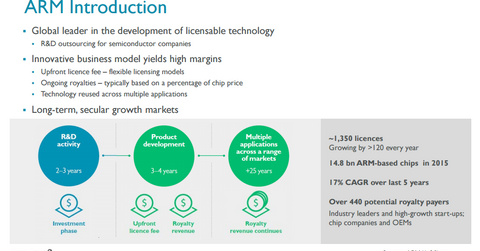What Are the Conditions for the ARM Holdings-Softbank Merger?
ARM Holdings and Softbank are merging in a cash transaction. In an unusual step, there aren’t regulatory or antitrust conditions to the transaction.
July 22 2016, Updated 1:09 p.m. ET

Basics of the transaction
As we discussed previously in this series, ARM Holdings (ARMH) and Softbank are merging in a cash transaction. The companies are guiding for a mid-November close. In an unusual step, there aren’t regulatory or antitrust conditions to the transaction. In the US, this isn’t permitted. If a target is above a certain size, the buyer must file Hart-Scott-Rodino antitrust and get permission to merge. In this case, Softbank is a holding company. It doesn’t appear to have any semiconductor businesses, so there isn’t an overlap.
Merger conditions
- ARM Holdings shareholder vote (75% condition)
- all conditions satisfied by 11/17/16
- court sanction of the scheme
- release of the scheme document
- no antitrust or regulatory conditions
Non-solicitation agreement
The press release doesn’t mention anything about non-solicitation or breakup fees. These issues might be discussed more when the scheme document is released. The takeover rules in the US and the United Kingdom are different in many ways. The scheme document should lay out the details of any agreements. Note that the main insiders at ARM Holdings have entered into an irrevocable undertakings agreement where they pledge to vote their shares in favor of the merger.
Merger arbitrage resources
Other important merger spreads include the deal between Cigna (CI) and Anthem (ANTM) and KLA-Tencor (KLAC) and Lam Research (LRCX). For a primer on risk arbitrage investing, read Merger Arbitrage Must-Knows: A Key Guide for Investors.
Investors who are interested in trading in the tech sector can look at the iShares Global Technology ETF (IXN).
